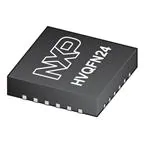NXP remote keyless entry
transponder combo IC
NCF2960
Compact, single-chip solution
for remote keyless entry
Delivering rugged performance in a very small (4 x 4 mm) footprint, this highly integrated solution
maximizes design freedom and is ideal for advanced Combo-Key applications. Special features of`
the integrated RF transmitter support frequency hopping and ensure reliable operation even in`
RF-jammed environments.
Key features
`` Single-chip security transponder and keyless entry solution
`` 16-bit Harvard architecture
`` On-chip UHF transmitter (315 / 434 / 868 / 915 MHz band)
`` Transponder emulation based on HT3, HT-AES, or HT-Pro 2
`` Calculation unit supporting HT3 (96-bit) and AES (128-bit)
`` 16 KB user EROM for application
`` 2 KB ultra-low-power EEPROM
`` 1 KB RAM
`` Up to eight command buttons with wake-up function
`` I/O with current source for direct LED drive
`` Stabilized RF output power
`` Temperature sensor
`` Single lithium cell operation (2.1 to 3.6 V)
`` C-compiler supported software development
`` HVQFN24 (4 x 4 mm) with wettable flanks
Applications
`` Combo-Key applications that combine remote keyless entry
with vehicle immobilization
The NXP NCF2960 is a second-generation Combo-key solution
that combines a transponder, a microcontroller, and a radio
transmitter in a tiny (4 x 4 mm) footprint.
The basic transponder operation is compatible with NXP’s
security transponder families, including HT3, HT-AES, and `
HT-Pro2. Custom transponder functions can be implemented
using the ROM library of the device by the application.
The transponder circuitry is powered from the LF field and
does not require a device battery supply. As a result, full
operation is possible even when the battery is low.
The RISC controller uses NXP’s third-generation Micro RISC
Kernel (MRK III), a low-power implementation that features
a 16-bit architecture and executes instructions in a single
machine clock cycle.
�The on-chip UHF transmitter requires only a single 27.6 MHz
reference crystal and loop antenna matching circuitry to operate
in one of the following bandwidths: 315 / 434 / 868 / 915 MHz
bands. The RF multi-channel capability enables frequency
hopping and ensures reliable operation in RF-jammed environments.
There are up to eight I/O ports, with one designed for use with a
dedicated LED driver port, and up to eight inputs for command
buttons. There is a temperature sensor for battery management
and an on-chip pseudo-random number (PRN) generator for use
with security protocols.
A fractional-N PLL allows compensation for initial XTL tolerance.
The device includes 2 KB of ultra-low-power serial EEPROM
memory (with access control defined by the application), 1 KB `
of RAM, and up to 16 KB of Flash-like EROM for the application
code. The keyless entry code can be generated by the built-in,
hardwired calculation unit or by a software-based algorithm.
The device is housed in a tiny 24-pin HVQVN package that
consumes only 16 mm2 of board space, so it enables ultracompact designs with maximum freedom for key styling.
Wettable package flanks allow optical soldering inspection
without an x-ray.
The Flash-like EROM of the device supports in-circuitry
programming and debugging of the application code.
NCF2960 application diagram
24-pin HVQN package (4 x 4 mm)
NCF2960 demo board
www.nxp.com
© 2012 NXP Semiconductors N.V.
All rights reserved. Reproduction in whole or in part is prohibited without the prior written consent of the copyright owner. The
Date of release: August 2012
information presented in this document does not form part of any quotation or contract, is believed to be accurate and reliable and
Document order number: 9397 750 17233
may be changed without notice. No liability will be accepted by the publisher for any consequence of its use. Publication thereof
Printed in the Netherlands
does not convey nor imply any license under patent- or other industrial or intellectual property rights.
�
很抱歉,暂时无法提供与“NCF2960XHN/T0B04AJ”相匹配的价格&库存,您可以联系我们找货
免费人工找货